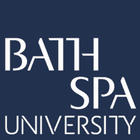About Photography BA (hons) in Bath Spa University
Engage with photography in an experimental, creative and critical environment.
- Hands-on, experiential approach with the emphasis on developing your individual interests and ability.
- Opportunities to work on live briefs and a range of professional workshops with our industry partners.
- Great links including the Royal Photographic Society and Association of Photographers.
Photography at Bath Spa University gives you space to explore, actively enquire, challenge and define the role of the photographic image.
We’re committed to teaching the craft of photography. Analogue techniques are thoroughly explored and equip you to engage more proficiently with digital methods. We explore the ways in which digital technological change impacts on photography, and we also fully utilise new technologies.
The curriculum is broad, with an emphasis on practical learning. Content is delivered by a team of full-time and visiting specialists who are active practitioners and researchers in the field.
Overview
You’ll develop your creative ability and technical skills through a range of set and self-directed projects. Modules cover broad contexts of photography including fashion, documentary, landscape, portraiture and editorial.
Opportunities
Work placements, industry links and internships
The course works closely with a variety of industry partners and associations such as the Royal Photographic Society and Fox Talbot Museum. There are opportunities to work on live project briefs, participate in work experience, and collaborate with a wide range of industry practitioners.
Careers
Graduates of Photography at Bath Spa University have entered careers in:
- photo journalism
- fashion photography
- product photography
- portrait photography
- photo editing
- editorial design
- advertising
- curation
- art direction
- marketing
- studio management
- teaching
Academic qualification equivalents
- Higher Secondary School Certificate/Indian School Certificate (standard XII) from the following boards CBSE/CISCE/WBCHSEB, with 65%, including grade C in at least five subjects.
English language requirements (one of the below):
- IELTS:Academic 6.0 overall This must include a minimum of 5.5 in Listening, Speaking, Reading and Writing.
- TOEFL iBT: A total of 72, to include a minimum 18 in Reading, 17 in Listening, 20 in Speaking, and 17 in Writing.
- PTE: This must include a minimum of 51 in Listening, Speaking, Reading and Writing.
Bath Spa University Highlights
| Type |
Public |
| Campus Setting |
Urban |
| Tuition Fees for International Students (full-time degrees in 2020-2021) |
13,700 GBP - 15,300 GBP (varies with the courses) |
| Campus Housing Capacity |
25% |
| Student Retention Rate |
89% |
| Scholarship Availability |
Yes |
| Applications Accepted |
Online |
| Work-Study |
Available |
| Intake Type |
Yearly |
| Mode of Program |
Full time and part-time |
Bath Spa University Average Tuition Fees And Other Expenses
International students joining the Bath Spa University are required to pay 70% of the tuition fees on or before arrival and commencement of the course. All payments should be made in £ sterling and the easiest way to make a payment is via Flywire. However, the payment can also be made through credit/debit card.
International students should open a UK bank account as soon as possible after arrival.
The estimated cost of attendance depends on several factors like the program applied for, tuition, books, fees, housing, dining, and personal items.
| Expenses In GBP |
Undergraduate (per annum) |
Graduate (per annum) |
| Tuition Fee for International Students (full-time courses) |
13,700- 15,300 (varies with the field of study chosen) |
13,700- 15,300 (varies with the field of study chosen) |
| Career and Professional Development Fees |
145 |
145 |
| Housing and Rooms |
8,412 |
8,412 |
| Health Insurance |
150 |
150 |
| Books and Supplies |
500 |
500 |
| Meals |
3,225 |
3,225 |
| Personal Expenses |
792 |
792 |
